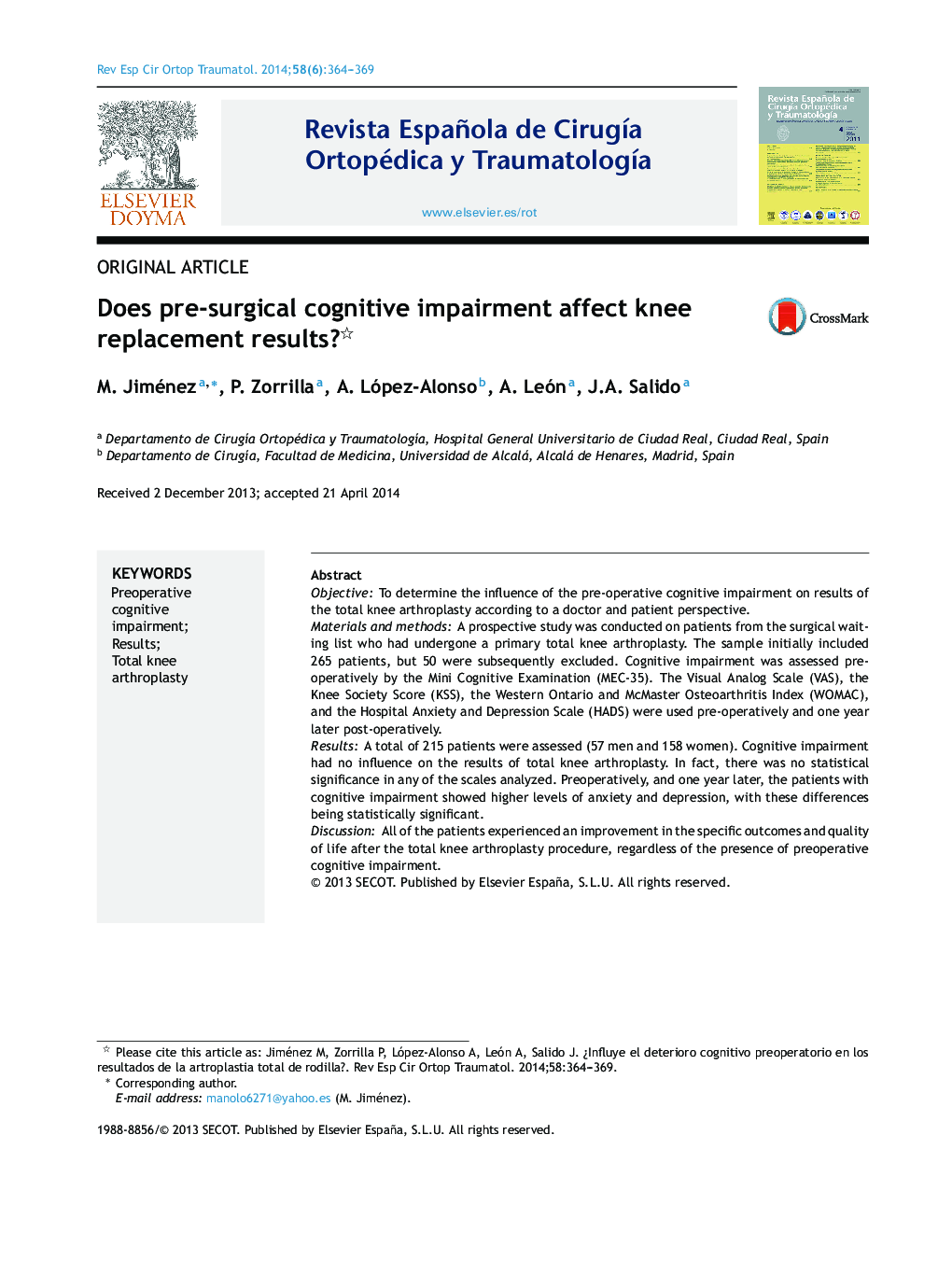| کد مقاله | کد نشریه | سال انتشار | مقاله انگلیسی | نسخه تمام متن |
|---|---|---|---|---|
| 4087186 | 1268021 | 2014 | 6 صفحه PDF | دانلود رایگان |

ObjectiveTo determine the influence of the pre-operative cognitive impairment on results of the total knee arthroplasty according to a doctor and patient perspective.Materials and methodsA prospective study was conducted on patients from the surgical waiting list who had undergone a primary total knee arthroplasty. The sample initially included 265 patients, but 50 were subsequently excluded. Cognitive impairment was assessed pre-operatively by the Mini Cognitive Examination (MEC-35). The Visual Analog Scale (VAS), the Knee Society Score (KSS), the Western Ontario and McMaster Osteoarthritis Index (WOMAC), and the Hospital Anxiety and Depression Scale (HADS) were used pre-operatively and one year later post-operatively.ResultsA total of 215 patients were assessed (57 men and 158 women). Cognitive impairment had no influence on the results of total knee arthroplasty. In fact, there was no statistical significance in any of the scales analyzed. Preoperatively, and one year later, the patients with cognitive impairment showed higher levels of anxiety and depression, with these differences being statistically significant.DiscussionAll of the patients experienced an improvement in the specific outcomes and quality of life after the total knee arthroplasty procedure, regardless of the presence of preoperative cognitive impairment.
ResumenObjetivoDeterminar la influencia del deterioro cognitivo preoperatorio en los resultados de la artroplastia total de rodilla, no solo desde la perspectiva del médico sino también del paciente.Material y métodoEstudio prospectivo de pacientes procedentes de la lista de espera quirúrgica, sometidos a artroplastia total de rodilla primaria. De los 265 pacientes de la muestra inicial, 50 fueron excluidos. El deterioro cognitivo fue valorado preoperatoriamente mediante el Mini Examen Cognoscitivo (MEC-35). Tanto preoperatoriamente como al año postoperatorio se utilizó la Escala Analógica Visual (EVA), la Knee Society Score (KSS), el Western Ontario and McMaster Universities Osteoarthritis Index (WOMAC), y el Hospital Anxiety and Depression Scale (HADS).ResultadosSe analizaron 215 pacientes (57 varones y 158 mujeres). El deterioro cognitivo no influyó en los resultados de la artroplastia total de rodilla, no alcanzando significación estadística en ninguna de las escalas analizadas. Los pacientes con deterioro cognitivo presentaron niveles más elevados de ansiedad y depresión, preoperatoriamente, y al año de intervención, siendo estas diferencias estadísticamente significativas.DiscusiónTodos los pacientes experimentaron una mejoría de los resultados tanto específicos como de calidad de vida tras un procedimiento como la artroplastia total de rodilla independientemente de la presencia de deterioro cognitivo preoperatorio.
Journal: Revista Española de Cirugía Ortopédica y Traumatología (English Edition) - Volume 58, Issue 6, November–December 2014, Pages 364–369